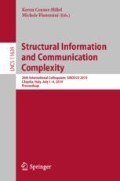Abstract
It is well known that the areas of self-stabilizing algorithms and local algorithms are closely related. Using program transformation techniques local algorithms can be made self-stabilizing, albeit an increase in run-time or memory consumption is often unavoidable. Unfortunately these techniques often do not apply to randomized algorithms, which are often simpler and faster than deterministic algorithms. In this paper we demonstrate that it is possible to take over ideas from randomized distributed algorithms to self-stabilizing algorithms. We present two simple self-stabilizing algorithms computing a maximal independent set and a maximal matching and terminate in the synchronous model with high probability in \(O(\log n)\) rounds. The algorithms outperform all existing algorithms that do not rely on unique identifiers.
This work is supported by the Deutsche Forschungsgemeinschaft (DFG) under grant DFG TU 221/6-3.
Access this chapter
Tax calculation will be finalised at checkout
Purchases are for personal use only
References
Afek, Y., Kutten, S., Yung, M.: The local detection paradigm and its applications to self-stabilization. Theor. Comput. Sci. 186(1), 199–229 (1997)
Alon, N., Babai, L., Itai, A.: A fast and simple randomized parallel algorithm for the maximal independent set problem. J. Algorithms 7(4), 567–583 (1986)
Awerbuch, B., Varghese, G.: Distributed program checking: a paradigm for building self-stabilizing distributed protocols. In: Proceedings of 32nd Annual Symposium of Foundations of Computer Science, pp. 258–267, October 1991
Awerbuch, B., Patt-Shamir, B., Varghese, G., Dolev, S.: Self-stabilization by local checking and global reset. In: Tel, G., Vitányi, P. (eds.) WDAG 1994. LNCS, vol. 857, pp. 326–339. Springer, Heidelberg (1994). https://doi.org/10.1007/BFb0020443
Barenboim, L., Elkin, M., Goldenberg, U.: Locally-iterative distributed \((\varDelta +1)\)-Coloring below szegedy-vishwanathan barrier, and applications to self-stabilization and to restricted-bandwidth models. In: Proceedings of ACM Symposium on Principles of Distributed Computing, pp. 437–446 (2018)
Barenboim, L., Elkin, M., Pettie, S., Schneider, J.: The locality of distributed symmetry breaking. J. ACM 63(3), 20:1–20:45 (2016)
Boulinier, C., Petit, F., Villain, V.: Synchronous vs. Asynchronous Unison. In: Tixeuil, S., Herman, T. (eds.) SSS 2005. LNCS, vol. 3764, pp. 18–32. Springer, Heidelberg (2005). https://doi.org/10.1007/11577327_2
Cohen, J., Lefevre, J., Maamra, K., Pilard, L., Sohier, D.: A self-stabilizing algorithm for maximal matching in anonymous networks. PPL 26(04), 1650016 (2016)
Devismes, S., Tixeuil, S., Yamashita, M.: Weak vs. self vs. probabilistic stabilization. Int. J. Found. Comput. Sci. 26(3), 291–319 (2015)
Dolev, S., Israeli, A., Moran, S.: Analyzing expected time by scheduler-luck games. IEEE Trans. Softw. Eng. 21(5), 429–439 (1995)
Fischer, M.: Improved deterministic distributed matching via rounding. In: Richa, A. (ed.) Distributed Computing, vol. 91, pp. 17:1–17:15. Springer, Heidelberg (2017). https://doi.org/10.1007/s00446-018-0344-4
Ghaffari, M.: An improved distributed algorithm for maximal independent set. In: Proceedings of 27th Annual ACM-SIAM Symposium on Discrete Algorithms, pp. 270–277 (2016)
Guellati, N., Kheddouci, H.: A survey on self-stabilizing algorithms for independence, domination, coloring, and matching in graphs. J. Parallel Distrib. Comput. 70(4), 406–415 (2010)
Herman, T.: Probabilistic self-stabilization. IPL 35(2), 63–67 (1990)
Herman, T., Ghosh, S.: Stabilizing phase-clocks. IPL 54(5), 259–265 (1995)
Israeli, A., Itai, A.: A fast and simple randomized parallel algorithm for maximal matching. IPL 22(2), 77–80 (1986)
Kravchik, A., Kutten, S.: Time optimal synchronous self stabilizing spanning tree. In: Afek, Y. (ed.) DISC 2013. LNCS, vol. 8205, pp. 91–105. Springer, Heidelberg (2013). https://doi.org/10.1007/978-3-642-41527-2_7
Lenzen, C., Suomela, J., Wattenhofer, R.: Local algorithms: self-stabilization on speed. In: Guerraoui, R., Petit, F. (eds.) SSS 2009. LNCS, vol. 5873, pp. 17–34. Springer, Heidelberg (2009). https://doi.org/10.1007/978-3-642-05118-0_2
Lotker, Z., Patt-Shamir, B., Pettie, S.: Improved distributed approximate matching. J. ACM 62(5), 38:1–38:17 (2015)
Métivier, Y., Robson, J.M., Saheb-Djahromi, N., Zemmari, A.: An optimal bit complexity randomized distributed MIS algorithm. Distrib. Comput. 23(5), 331–340 (2011)
Peleg, D.: Distributed Computing: A Locality-Sensitive Approach. SIAM Society for Industrial and Applied Mathematics, Philadelphia (2000)
Turau, V.: Computing fault-containment times of self-stabilizing algorithms using lumped Markov chains. Algorithms 11(5), 58 (2018)
Author information
Authors and Affiliations
Corresponding author
Editor information
Editors and Affiliations
Rights and permissions
Copyright information
© 2019 Springer Nature Switzerland AG
About this paper
Cite this paper
Turau, V. (2019). Making Randomized Algorithms Self-stabilizing. In: Censor-Hillel, K., Flammini, M. (eds) Structural Information and Communication Complexity. SIROCCO 2019. Lecture Notes in Computer Science(), vol 11639. Springer, Cham. https://doi.org/10.1007/978-3-030-24922-9_21
Download citation
DOI: https://doi.org/10.1007/978-3-030-24922-9_21
Published:
Publisher Name: Springer, Cham
Print ISBN: 978-3-030-24921-2
Online ISBN: 978-3-030-24922-9
eBook Packages: Computer ScienceComputer Science (R0)

